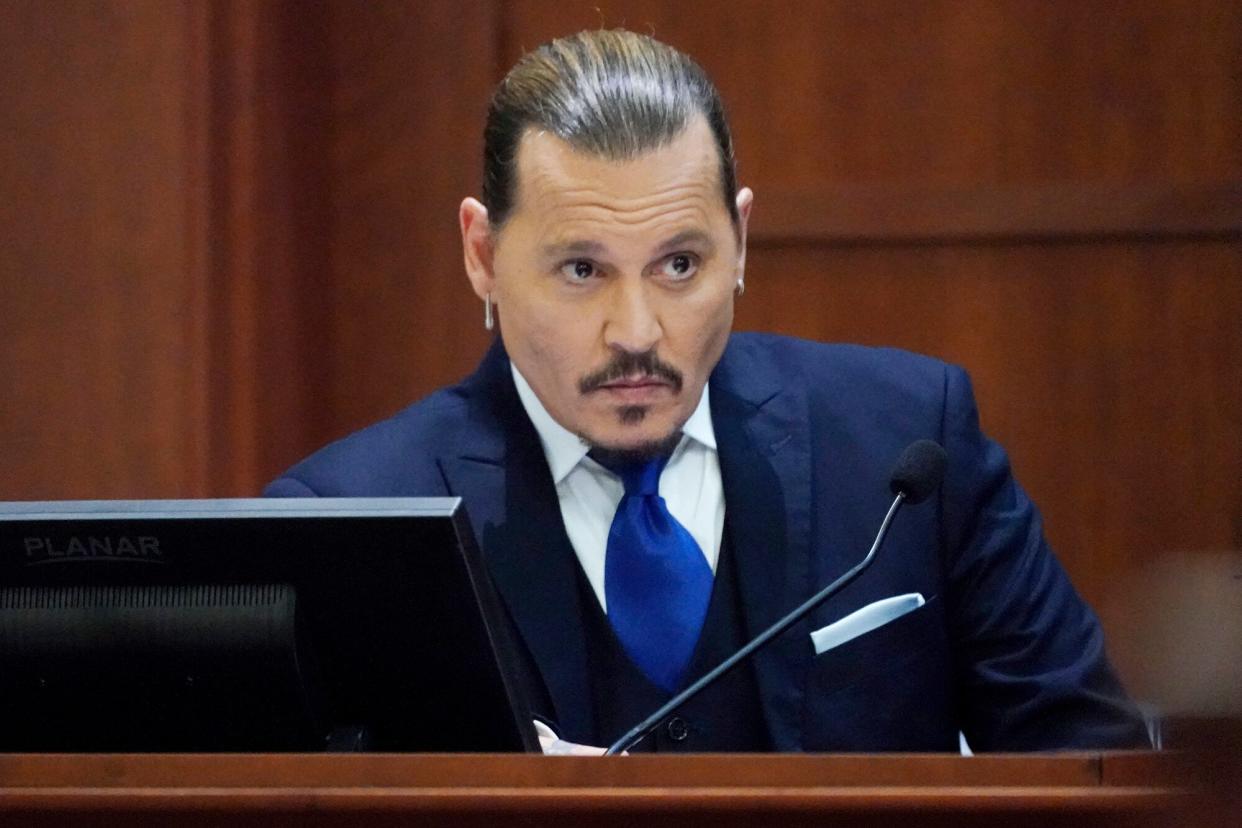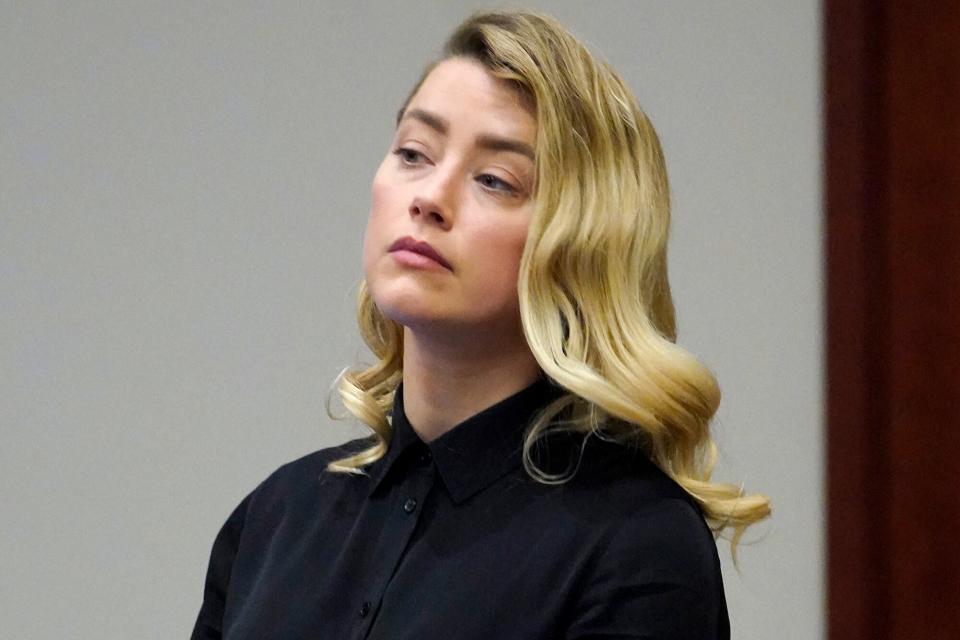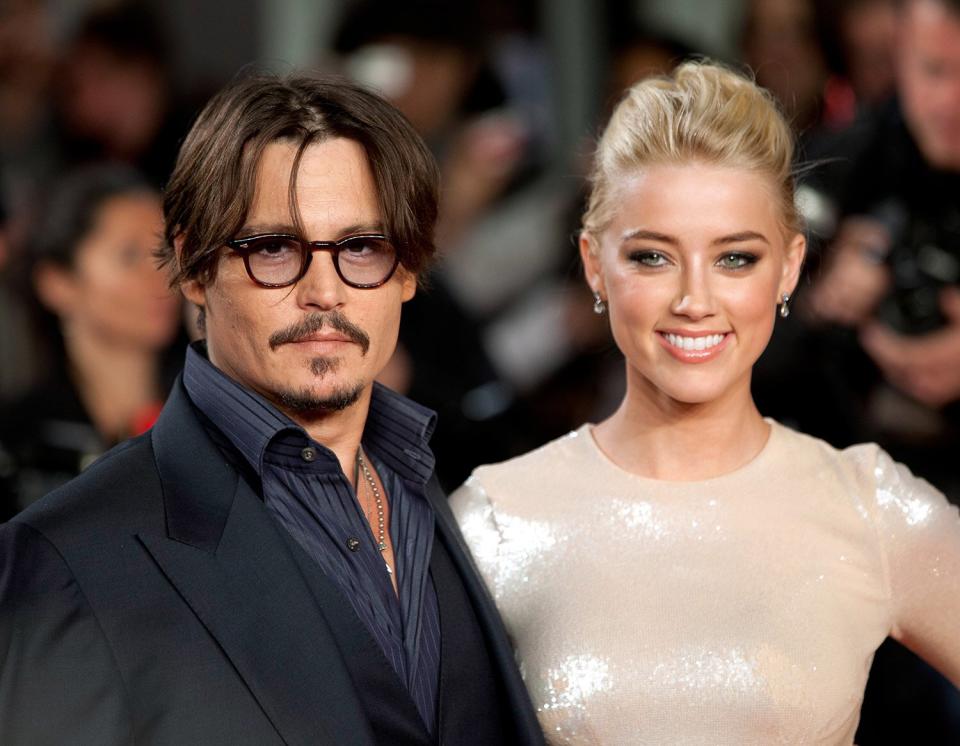Experts weigh in on Johnny Depp and Amber Heard trial: Possible outcomes, 'mutual abuse,' and more

- Oops!Something went wrong.Please try again later.
- Oops!Something went wrong.Please try again later.
Johnny Depp's defamation lawsuit against Amber Heard continues this week in Fairfax County, Va., shining a light on their tumultuous relationship while igniting discussions and debate about issues of domestic violence, mental health, substance abuse, and more.
Depp is suing Heard, his ex-wife, for $50 million over an op-ed she wrote for the Washington Post in 2018 chronicling her experiences as a domestic abuse survivor. Though Heard never mentioned Depp by name, his lawyers argue that references to their client (and Heard's previous public abuse allegations) are clear, and that the piece damaged Depp's career and reputation. Heard has filed a $100 million countersuit, alleging that Depp and his legal team defamed her by calling her allegations a hoax.
According to Dr. Jill Huntley Taylor, a legal analyst and the CEO of Taylor Trial Consulting, a trial strategy and jury consulting firm for civil and criminal cases, there are two challenges for both parties in the suit. The first, and most obvious, is the truth: Jurors must be convinced whether Depp abused Heard. "If jurors conclude that this was a mutually abusive relationship, some may see her [op-ed] as technically correct," Taylor tells EW. "However, other jurors may believe what [Heard] wrote was only a half-truth, and therefore deceptive."

STEVE HELBER/POOL/AFP via Getty Images Johnny Depp in court
The second challenge is the focus of the lawsuit: the op-ed itself. To prevail in court, Depp has to prove malice on Heard's part. "The testimony that she [initially] wanted his name included [in the op-ed] may suggest malice," Taylor says, "but the timing prior to her movie release may suggest her real motive was to benefit herself." The jurors, Taylor contends, are likely to view Heard and Depp's relationship as mutually abusive, a divisive analysis that was previously put forth by Dr. Laurel Anderson, Heard and Depp's former couples therapist, in a pre-recorded deposition.
Anderson testified that Heard once told her it was a "point of pride to her if she felt disrespected to initiate a fight," and that Heard reported striking Depp "to keep him there, because she would rather be in a fight than have him leave." Anderson later clarified that Heard said she "fought back" after Depp got physical. The mutual abuse claim has proven controversial. Some experts say that mutual abuse is a myth, and that Depp and Heard's dynamic was one of reactive abuse, with power imbalances in which Depp had the upper hand. Others experts say that abuse is not always perpetrated solely by one person, and that there isn't always a power imbalance.
During testimony this week, Heard's first witness, a psychologist and expert in interpersonal violence, denied that mutual abuse occurred between Heard and Depp. Dr. Dawn Hughes said she witnessed "very clear psychological traumatic effects" during her evaluations of Heard, as a result of "intimate partner violence by Mr. Depp." She also testified that Heard employed psychological aggression and reactive violence during altercations.
"I understand the pushback against the term ['mutual abuse']," Dr. Darcy Sterling, a relationship therapist and clinical social worker, tells EW. "In instances where a victim only puts their hands on their partner in self-defense, it should not be used — presuming we're only talking about physical abuse, which is rare, because physical abuse almost always comes with emotional abuse. That being said, abuse is not always perpetrated exclusively by one partner."
Sterling adds, "Both partners were egregious in their behaviors, and neither seems to realize their culpability. Things are always easier to make sense of when one person is clearly a victim and the other a perpetrator. I wish life were more concrete and there was always one clear perpetrator and one indisputable victim, but relationships are comprised of people, and people are complicated. In my 27 years of practicing as a therapist, the vast majority of relationships I've seen show problems in both partners."

STEVE HELBER/POOL/AFP via Getty Images Amber Heard in court
Dr. Ziv Cohen, a psychiatrist and head physician for Principium Psychiatry, offers this analysis: "Power has objective and subjective components. A relationship can be mutually abusive in that each partner may be emotionally or physically abusive to the other, [but] if there is a power imbalance in the relationship due to strength, wealth, status, intelligence, and so on, the more powerful person may be the abuser — but not necessarily so."
Cohen continues, "It is possible that the more powerful person has vulnerabilities, such as emotional dependence on the partner, which would lead the more powerful person to be abused or even exploited." With Depp's team arguing that he was abused by Heard and Heard's team arguing that she reacted with violence in response to abuse and out of distress, including post-traumatic stress disorder, the jury will have to weigh whether Depp was "also a vulnerable person with a history of abuse himself and Heard in fact mistreated him, rather than the other way around."
Taylor also thinks the #MeToo movement could factor in, and may give Heard an advantage. With more voices calling out pervasive harassment and abuse in Hollywood and beyond, "jurors have shown a greater tendency to defer to women who allege to be victims of abuse," she says. "Jurors are now less likely to engage in the victim-blaming of the past; this advantages [Heard], generally." However, Depp's case is "built around the same narrative as Heard's," Taylor contends. "He is not only disputing her public claims to be the victim of abuse, but he is claiming to be the victim of abuse himself.
"He is, in essence, making his own #MeToo claim," she continues. "Are jurors willing to let him make an abuse claim too, or do they see it as victim-blaming? This will come down to both credibility and evidence."

John Phillips/getty Johnny Depp and Amber Heard in 2011
Taylor expects the volatile audio recordings between Depp and Heard to feature in Depp's team's closing argument. "One point I expect to hear from the Depp team in closing is that with the hours and hours of secret recordings, there are no recordings of abuse," she says. "Jurors also heard Ms. Heard's own voice saying harmful things. She has admitted some level of abuse. It helps his credibility to acknowledge imperfections and not to run away from his use of drugs or admit the negative connotation of the language used in texts and recordings."
According to Sterling, the recordings are one of "many" relationship red flags. "It speaks to how blithely unaware each of them are of their role in the relationship problems," she says. "People who record disagreements almost always do it because they think they're innocent. Having a limited ability to see yourself critically is consistent with people diagnosed with borderline personality disorder, which Dr. Shannon Curry diagnosed Heard with last week. It's one of the reasons why people with BPD so rarely get the help they need, because they have such resistance to seeing themselves as being part of the problem, which stops them from being part of the solution."
Taylor expects the next few days to be a "full-on attack" on Depp's drug use, with Heard's team presenting the actor's "out of control" lifestyle as a contributor to his alleged abuse. "No matter who wins, there are truly no winners," Taylor says. "This is a case of a toxic relationship, and no one is coming out of it unscathed, regardless of whether monies change hands." She adds, however, that Depp has "displayed a charisma and charm on the stand that may have ingratiated him with jurors."
Cohen agrees that Depp's demeanor might have garnered sympathy from jurors, though he thinks Depp's lifestyle and substance use could be detrimental. "Depp lives an enormously privileged life," he says. "The jurors may have been alienated by these unflattering elements of his personality [and] find it hard to accept that he was truly damaged by Heard, as opposed to behaving in a self-destructive manner for which he is now assigning blame." The case, Cohen says, is so complex that it's hard to predict an outcome, but it "seems that Depp so far has succeeded in arguing that the relationship was a toxic one, and that he may not in fact have abused Heard."
However, Cohen says, "We will need to see if that portrayal will be able to withstand a vigorous presentation of Heard's perspective, including her own testimony, which may be powerful particularly if she relates horrific abuse." (Heard began testifying Wednesday.)
Sterling, for her part, believes that Depp — a "white, straight, wealthy male" — has a better chance of winning. And that, she says, "has nothing to do with the case, and everything to do with society."
Related content:

